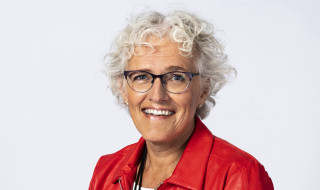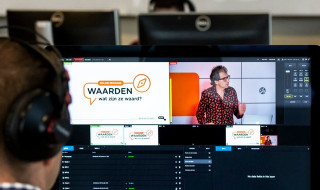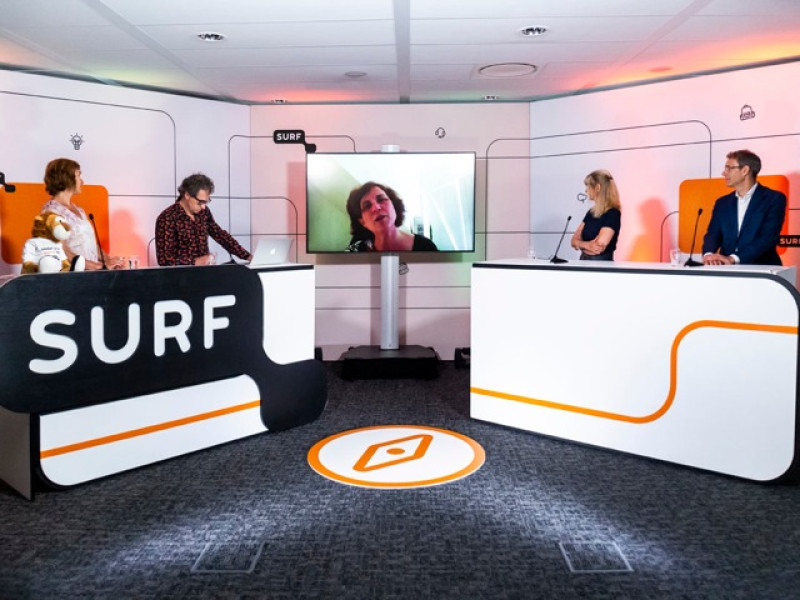With a series of seven online seminars for board members in education and research, SURF is initiating the discussion about how we as a sector can join forces to protect public values in IT. We look back at the seminar series with some of the board members present in 3 SURF Magazine articles.
Review of the seminar series on public values - part I
With HAN board member Yvonne de Haan, we look back on the first 3 meetings of the seminar series Values, what are they worth?
The first three meetings formed an exploration of the emergence of tensions between cultural, private and public values in the process of digitisation. The following topics were discussed successively: Europe's role as protector of Western values; the relationship between big tech and education and research; and the differences between a public and a private view of values.

Yvonne de Haan, Vice President of the Executive Board at the University of Arnhem and Nijmegen (HAN)
Yvonne de Haan, Vice President of the Executive Board at the University of Arnhem and Nijmegen (HAN), looks back on the sessions with pleasure. 'I have heard some new and interesting perspectives. For example, NPO wants to be a platform where different views meet. In order to achieve that mission online, they try to steer viewers in new directions with a 'public algorithm', instead of just serving them what they already know and appreciate. It is good that they are taking that responsibility. We have the same responsibility in education, where we have to support students in distinguishing between true and false information.'
'Standardisation seems the most logical solution from a business point of view, but sometimes, from deeper values, you have to opt for variation.'
Europe as protector of Western values
De Haan was also set thinking by Alex Brenninkmeijer, member of the European Court of Auditors and professor of Institutional Aspects of the Rule of Law at Utrecht University. He talked about the right to be forgotten. 'From the point of view of education, this is particularly relevant. Experiments, excursions and failures from your student days should not haunt you for the rest of your life.
In the first session, Brenninkmeijer spoke with Rob de Wijk, founder of The Hague Centre for Strategic Studies and Professor of International Relations at Leiden University. Subject of the discussion was the protection of Western values, while for example China is gaining power on the world stage. De Haan was pleasantly surprised by the optimism both speakers showed about the power of Europe.

As board members, we too sometimes feel that we could do with a little less European regulation,' she says. But Brenninkmeijer and De Wijk illuminate the subject from the point of view of consumer protection, creating a level playing field and regulating the industry. That is how Europe protects our Western values. So the regulations do matter. I liked that. The values in question, such as autonomy, safety and inclusion, do indeed lie at the heart of many public organisations and our actions, but they are not always explicitly stated, she thinks. At the HAN we are preparing a new institutional plan. We are using the terms 'smart, clean and social' as a steppingstone. That peg fits the image of the times, but underneath are also age-old values on which our western society is built, such as good citizenship.
Disruption offers new opportunities, as long as you shape them and don't just sit around waiting.
Giving monopolists less space
What are these old public values worth in relation to Big Tech? That was the subject of the second session. Jeff Bullwinkel, Associate General Counsel and Director of Corporate, External & Legal Affairs of Microsoft Europe, talked to Ron Augustus, Chief Innovation Officer of SURF. Bullwinkel put forward the proposition that Big Tech needs to regain the trust it has lost in recent years. European legislation, such as the GDPR (AVG), will help, according to Bullwinkel. Ron Augustus called on the education sector to set the tone when it comes to public values and to set its own conditions, independent of what Europe comes up with and what the tech companies themselves propose.
De Haan is well disposed to this call. We have to make sure that we remain in control. How do we join forces to make a bigger fist for the big tech companies? What do we consider negotiable and what not?
'We have to make sure we stay in control. What do we consider negotiable and what not?'
She finds the notion that the monopolist gets less room as the education sector chooses for more variation, by embracing both Microsoft Teams and Zoom, for example, interesting. Standardisation is the most logical solution from a purely commercial point of view, but sometimes deeper values force us to make different choices.
Is it useful to draw up a manifesto so that tech companies know the minimum they need to commit to in order to be allowed to work with higher education? Yes, with the caveat that a manifesto is always time-sensitive. It is relevant to include the choice of open source software in a manifesto, but that choice is based on deeper values, namely the desire for IT to be accessible and available. And these underlying values must be kept in mind. So we can't avoid mentioning fundamental values, with the risk that people will then remark that the list is incomplete.
Consensus versus speed
This brings us to a sensitive point: reaching consensus. In session three, Martijn van Dam, member of the board of NPO, and Matthias Scholten, director of RTL, explained how, since 2012, they have been confronted with a disruption in the television landscape caused by platforms such as Netflix and YouTube. Both NPO and RTL responded by setting up their own on-demand platforms. Scholten would have preferred that all Dutch public broadcasters and commercial broadcasters would offer all their content on one Dutch platform. Only in cooperation can you offer an answer with speed to large foreign parties such as Netflix and Disney, was his message. But creating speed was not easy at NPO, which represents all kinds of broadcasters.
De Haan has worked for public broadcasting for ten years. She knows what she is talking about when she says that the consultation culture in education is even worse. There are two extremes. We can let SURF think about what's good for us - after all, SURF is us - or we can discuss everything in detail with everyone before we go any further. In practice, we have to find a middle ground. It's a constant balancing act to do the right thing and give a place to the not-so-good things.
The message that disruption offers new opportunities, provided you shape them yourself and don't just sit around waiting, is one that she is happy to hear. Corona is just as much a disruption of the status quo. Let's use digitisation to increase students' knowledge and make it easier to work. If you use that properly, there is more room for the contributions that we can make from education and research to the personal development of students, and that includes orientation towards values. I would also like to wish our community the same journey that we are currently on.
Text: Marjolein van Trigt
Photos: Eva Broekema and Beeldredaktie
Translation: Deepl
About the seminar series
The corona crisis is increasing the role of digitisation in education and with it our dependence on dominant market parties. Reason enough for SURF to organise a series of seven online seminars about protecting public values. Under the guidance of journalist and moderator Frénk van der Linden and philosopher Marjan Slob, board members will enter into discussion with one another. The series consists of 3 parts.
- Part I consisted of three meetings that together explored the emergence of tension between cultural, private and public values in the process of digitisation.
- Part II of the seminar series, which is the subject of this article, was about public values and IT in the context of education and research.
- In Part III, we explore how we can secure shared values in IT. We will share the conclusions from these sessions in the third article.
'Review of the seminar series on public values - part I' is an article from SURF Magazine. Monthly the newest articles in your inbox? Then subscribe to the SURF Magazine newsletter (in Dutch).
Questions about this article? Mail to magazine@surf.nl
